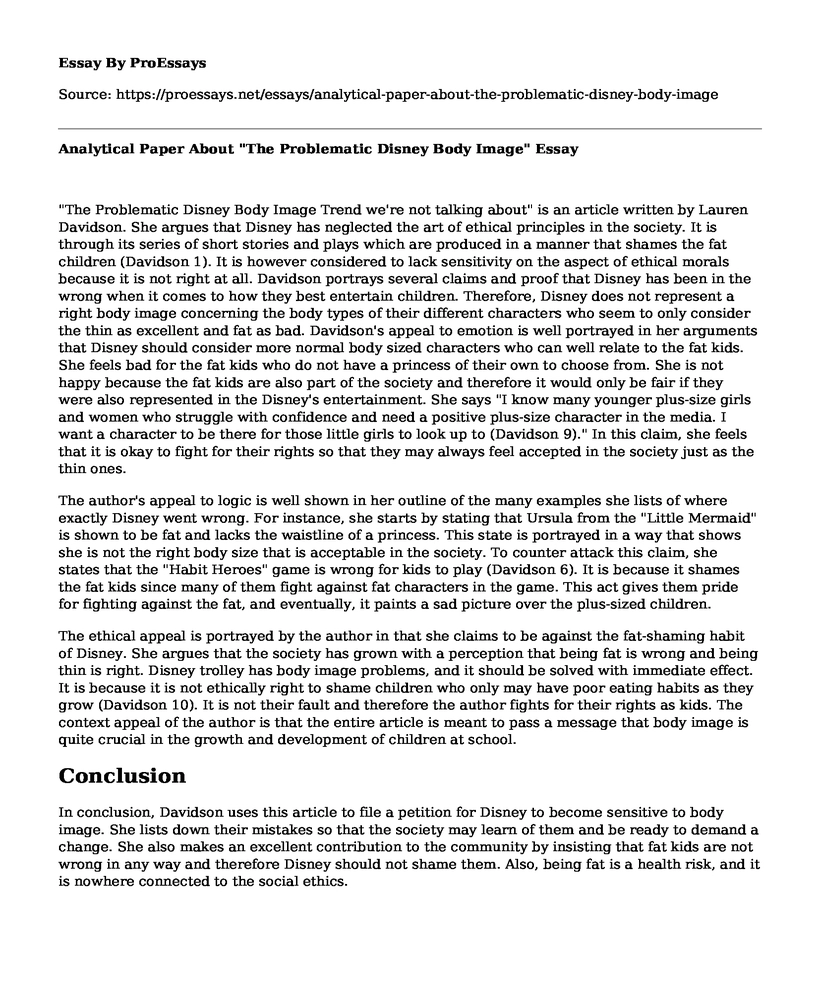"The Problematic Disney Body Image Trend we're not talking about" is an article written by Lauren Davidson. She argues that Disney has neglected the art of ethical principles in the society. It is through its series of short stories and plays which are produced in a manner that shames the fat children (Davidson 1). It is however considered to lack sensitivity on the aspect of ethical morals because it is not right at all. Davidson portrays several claims and proof that Disney has been in the wrong when it comes to how they best entertain children. Therefore, Disney does not represent a right body image concerning the body types of their different characters who seem to only consider the thin as excellent and fat as bad. Davidson's appeal to emotion is well portrayed in her arguments that Disney should consider more normal body sized characters who can well relate to the fat kids. She feels bad for the fat kids who do not have a princess of their own to choose from. She is not happy because the fat kids are also part of the society and therefore it would only be fair if they were also represented in the Disney's entertainment. She says "I know many younger plus-size girls and women who struggle with confidence and need a positive plus-size character in the media. I want a character to be there for those little girls to look up to (Davidson 9)." In this claim, she feels that it is okay to fight for their rights so that they may always feel accepted in the society just as the thin ones.
The author's appeal to logic is well shown in her outline of the many examples she lists of where exactly Disney went wrong. For instance, she starts by stating that Ursula from the "Little Mermaid" is shown to be fat and lacks the waistline of a princess. This state is portrayed in a way that shows she is not the right body size that is acceptable in the society. To counter attack this claim, she states that the "Habit Heroes" game is wrong for kids to play (Davidson 6). It is because it shames the fat kids since many of them fight against fat characters in the game. This act gives them pride for fighting against the fat, and eventually, it paints a sad picture over the plus-sized children.
The ethical appeal is portrayed by the author in that she claims to be against the fat-shaming habit of Disney. She argues that the society has grown with a perception that being fat is wrong and being thin is right. Disney trolley has body image problems, and it should be solved with immediate effect. It is because it is not ethically right to shame children who only may have poor eating habits as they grow (Davidson 10). It is not their fault and therefore the author fights for their rights as kids. The context appeal of the author is that the entire article is meant to pass a message that body image is quite crucial in the growth and development of children at school.
Conclusion
In conclusion, Davidson uses this article to file a petition for Disney to become sensitive to body image. She lists down their mistakes so that the society may learn of them and be ready to demand a change. She also makes an excellent contribution to the community by insisting that fat kids are not wrong in any way and therefore Disney should not shame them. Also, being fat is a health risk, and it is nowhere connected to the social ethics.
Work Cited
Davidson, Lauren. "The Problematic Disney Body Image Trend we're not talking about." Mic Network Inc. 2018.
Cite this page
Analytical Paper About "The Problematic Disney Body Image". (2022, Jun 16). Retrieved from https://proessays.net/essays/analytical-paper-about-the-problematic-disney-body-image
If you are the original author of this essay and no longer wish to have it published on the ProEssays website, please click below to request its removal:
- Rhetorical Analysis of Daddy Issues by Sandra Tsing Loh Essay
- Implications for the Treatment of PTSD - Essay Sample
- Essay Example on How Physical Activity Relates to Mental Health
- Essay Example on Olympic Athletes: Mental Imagery & Performance Stress Strategies
- Free Essay Sample on College Tuition: Rising Prices and Free Education Debate
- Free Essay Sample on How Social Media Can Affect Women's Mental and Physical Health
- Lead Contamination: Impacts on Health, Environment, and Communities - Essay Sample







